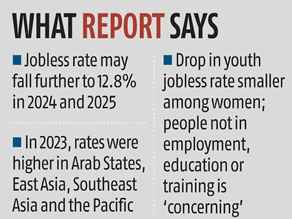TAG: GS-3: ECONOMY
CONTEXT:
The 20th-anniversary publication of the ILO’s Global Employment Trends for Youth (hereafter “GET for Youth”). As an anniversary edition, this GET for Youth looks back on what has been achieved since the dawn of the twenty-first century while also looking ahead to what may lay in store for youth employment in an era characterized by crises and uncertainties.
EXPLANATION:
The International Labour Organisation (ILO) report on global youth employment highlights:
- Youth Unemployment Rate: The global youth unemployment rate fell to 13% in 2023, the lowest in 15 years, down from 13.8% in 2019. It is projected to decrease further to 12.8% in 2024.
- Regional Variations: Despite the overall improvement, youth unemployment rates have risen in certain regions such as the Arab countries, East Asia, Southeast Asia, and the Pacific since 2019.
- Gender Disparities: The reduction in youth unemployment has been less pronounced for women. In 2023, the unemployment rate for young women was 12.9% compared to 13% for young men, indicating a narrowing of the gender gap.
- NEET Rates: The proportion of young people not in employment, education, or training (NEET) stands at 20.4%. The NEET rate is notably high among young women, with two-thirds of NEET individuals being female.
- Informal Employment: Over half of young workers globally are engaged in informal employment. In low-income countries, three-quarters of young workers hold self-employed or temporary jobs, while in high- and upper-middle-income economies, most young workers have regular and secure jobs.
- Lack of Decent Work: The report underscores a lack of progress in creating decent jobs for young people. Many young workers, despite being the most educated cohort ever, face job insecurity and limited access to high-skill roles.
- Sectoral and Skill Mismatches: Growth in high-skill and modern service jobs for youth has been limited, and the supply of high-skill jobs has not kept pace with the increasing number of educated youth, particularly in middle-income countries.

The report identifies the main principles for policy action as follows:
- Youth-Centric Policymaking: Ensure that youth lead in policymaking and strengthen youth-inclusive social dialogue institutions.
- Job Creation Focus: Prioritize job creation, particularly for young women, through gender-responsive economic policies.
- Address Global Inequalities: Enhance international cooperation, public-private partnerships, and development financing to tackle global inequalities.
About the International Labour Organization (ILO):
- It is a specialized agency of the United Nations (UN) dedicated to improving labor conditions and living standards throughout the world.
- History:
- It was created in 1919, as part of the Treaty of Versailles that ended World War I, to reflect the belief that universal and lasting peace can be accomplished only if it is based on social justice.
- In 1946, the ILO became a specialized agency of the newly formed UN.
- HQ: Geneva, Switzerland.
- It is also a member of the United Nations Development Group (UNDP), a coalition of UN organization aimed at helping meet the Sustainable Development Goals.
- Members: The ILO has 187 member states: 186 out of 193 UN member states plus the Cook Islands.
- Structure: It is the only tripartite U.N. agency, that brings together governments, employers and workers’ representatives of 187-member States.
- It serves its tripartite constituents – and society as a whole – in a variety of ways, including:
- Formulation of international policies and programmes to promote basic human rights, improve working and living conditions, and enhance employment opportunities
- Creation of international labour standards backed by a unique system to supervise their application
- An extensive programme of international technical cooperation formulated and implemented in an active partnership with constituents, to help countries put these policies into practice in an effective manner
- Training, education, and research activities to help advance all of these efforts
- In recognition of its activities, the ILO was awarded the Nobel Prize for Peace in 1969.
Source:
Spread the Word



